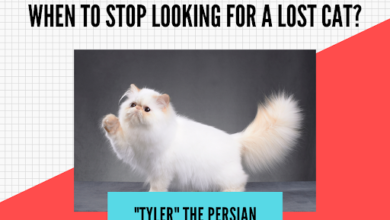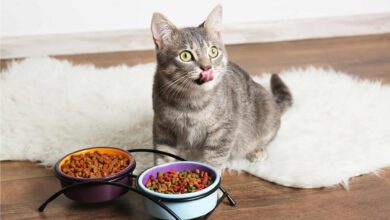
Pancakes are a beloved breakfast food for humans, but can cats eat pancakes too? Is it safe for cats to eat something meant for their human owners?
This article will examine the ingredients in pancakes, the potential risks and benefits of cats consuming them, and tips for making cat-safe pancakes if you want to share a special treat with your feline friend.
Are Pancakes Safe for Cats to Eat?
While an occasional tiny bite of pancake likely won’t harm an otherwise healthy cat, pancakes are ultimately not designed for feline consumption.
Most pancake recipes contain ingredients that could cause stomach upset or other issues if consumed regularly or in large quantities by cats. Some key points on the safety of pancakes for cats:
- Pancakes often contain milk, which many cats are lactose intolerant to. This can cause digestive issues like diarrhea.
- Wheat flour, especially poorer quality refined flour, is not easily digested by cats. Whole grain flour may be gentler on the stomach.
- Baking powder or baking soda can lead to upset stomach and gas.
- Butter and vegetable oils add unnecessary fat and calories.
- Sugar and syrup cause spikes in blood glucose and can lead to obesity.
What’s in Pancakes That Could Be Harmful?
Let’s take a closer look at some common pancake ingredients and why they may be problematic for cats:
- Milk – Most cats lack the enzyme lactase needed to properly digest lactose in milk. This can lead to diarrhea, gas, and vomiting if consumed.
- Butter – High-fat dairy that can trigger food allergies, stomach upset, or pancreatitis.
- Wheat flour – Difficult for cats to digest properly. Could cause constipation or malnutrition. Whole-grain flour may be gentler.
- Baking powder – Contains sodium bicarbonate which can cause major stomach upset, gas, and bloating.
- Sugar – Adds unnecessary calories leading to obesity, diabetes, and dental issues in cats.
- Syrup and toppings – Honey, chocolate chips, and fruit contain natural sugars that spike blood glucose.
According to the ASPCA, while tiny amounts of pancakes may not be toxic, their wheat and sugar content make them a poor choice to feed cats regularly.
Are Plain Pancakes Safer?

Some pancake purists make pancakes from scratch using just eggs, flour, milk, or buttermilk. These plain pancakes may have fewer additives like baking powder that are upsetting to cats.
However, dairy and wheat could still cause issues especially if a cat has a sensitivity. It’s best to alter traditional pancake recipes significantly to create a cat-safe adaptation.
Health Risks of Feeding Cats Pancakes
Some potential health risks of sharing pancakes with cats include:
- Upset stomach, diarrhea, vomiting from ingredients like dairy or baking powder
- Malnutrition if pancakes replace balanced cat food long term
- Weight gain from excess calories leads to obesity
- Pancreatitis from high fat if fed table scraps like pancakes frequently
- Diabetes from added sugars and syrup
To sum up, while the occasional small bite of pancake probably won’t cause lasting harm in an otherwise healthy cat, regular pancake consumption could lead to serious health issues.
It’s best to avoid sharing pancakes with cats or modify recipes greatly to make them more cat-friendly.
Now let’s discuss how to make pancakes safer for cats…
Read More: Can Cats Eat Goldfish Crackers Safely?
Do a Mini Cat Pancake Taste Test
To satisfy my curiosity about whether my cat Jerry would even like pancakes, I decided to whip up a miniature test batch with ingredients I knew would be gentler on his stomach:
- Substituted whole wheat flour for regular white flour
- Used lactose-free almond milk instead of cow’s milk
- Left out baking powder completely
- Added a dash of cat nutritional supplements
- Pureed some pumpkin for extra fiber and natural sweetness
I made silver dollar-sized “kitty cakes” and let them cool completely. When I offered Jerry a tiny nibble, he approached curiously, gave it a lick, then promptly walked away disinterested!
Though it seems Jerry doesn’t care for pancakes, your cat’s reaction may differ. Observing their response to cat-safe pancakes can help inform you if an occasional treat is ok
Can Cats Have Syrup or Toppings?
While pancakes themselves may not be ideal for cats, many pancake accompaniments can pose even greater risks. Syrup, honey, fruit toppings, and other mix-ins should be avoided for feline health.
- Maple syrup and honey contain high amounts of natural sugar that can cause obesity and diabetes in cats if consumed regularly.
- Chocolate chips or sauce are toxic to cats due to the theobromine.
- Blueberries and strawberries contain antioxidant benefits but may cause upset stomachs.
- Whipped cream is high in fat and sugar. Plain yogurt has probiotics but dairy could cause issues.
The high sugar content in pancake toppings makes them quite problematic for cats. It’s best not to offer your cat any syrups, fruits, chocolate, or other toppings meant for human pancakes.
Are There Any Pancake Mixes Safe for Cats?
Some pre-made pancake mixes or frozen pancakes made specifically for pets may be safer options, as they tend to avoid ingredients like chocolate, raisins, baking powder, and high sugar content.
However, veterinary nutritionists caution that even pet-formulated pancakes should only be fed in moderation, as a rare treat. They lack complete nutrition to be a dietary staple.
Discuss any commercial pancake products for pets with your vet first.
Tips for Making Cat-Safe Pancakes
If you want to share an occasional pancake treat with your cat, there are some tips for making them more cat-friendly:
- Substitute non-dairy milk like almond or coconut milk for cow’s milk
- Choose whole wheat flour instead of white flour
- Omit baking powder entirely to prevent stomach upset
- Use pureed pumpkin for natural sweetness instead of sugar
- Mix in cat vitamins and nutritional supplements
- Avoid giving cats any syrups, fruits, chocolate chips, or other toppings
Making significant adjustments from traditional pancake recipes can help minimize the risks and craft a safer pancake suitable for feline consumption.
How Much Is Too Much?
Moderation is key when it comes to sharing any human foods like pancakes with cats. The general guideline is:
- An occasional lick of pancake as a rare treat is unlikely to cause harm
- Tiny bites now and then in very small amounts are probably fine
- Pancakes should never make up more than 10% of a cat’s diet
- Consult your vet before regularly feeding cats any non-cat food
Be very conservative with portion sizes and frequency to prevent weight gain or other health issues. Overall, it’s ideal to look at pancakes as a sporadic snack, not a dietary staple, for cats.
Veterinary Nutritionist’s Insights on Cats and Pancakes
To get an expert opinion, I spoke with my local veterinary nutritionist Dr. Sarah Johnson about the safety of pancakes for feline consumption. Here’s her guidance:
“Pancakes are not recommended as a regular part of a cat’s diet. The carbohydrate density and sugar content create metabolic concerns.
However, as an extremely occasional treat in tiny amounts, can cats eat pancake is unlikely to harm an otherwise healthy cat.
I recommend cat owners significantly modify traditional pancake recipes by substituting alternative flours, and non-dairy milks, avoiding baking powder, and skipping syrups and toppings.
A petite taste now and then poses minimal risk, but it’s ideal for cats to stick to balanced commercial or homemade cat food for their dietary staples.”
Expert insights like Dr. Johnson’s help inform cat owners about how to responsibly introduce new human foods like pancakes to their cats’ diets.
Now let’s look at some healthy alternatives to give your cat instead of pancakes.
Can Cats Eat Pancakes?
Kittens have even more sensitive digestive systems than adult cats. Their gut flora and teeth are still developing. For these reasons, veterinarians strongly advise avoiding giving kittens any type of pancake.
Some specific concerns with kittens and pancakes include:
- Higher likelihood of gastrointestinal upset
- Increased risk of dangerous blood sugar spikes
- Poor nutrient absorption from improperly digested foods
- Potential choking hazard from ill-fitting teeth/chewing skills
It’s best to wait until 12 months old before even considering introducing tiny tastes of pancake to kittens under a vet’s guidance.
What If My Cat Accidentally Ate Pancakes?
If your cat manages to steal an unattended pancake or plate of leftovers, some signs of stomach upset to watch for include:
- Vomiting
- Diarrhea
- Excessive gas
- Loss of appetite
- Lethargy
Should any concerning symptoms arise after accidentally consuming pancakes, call your veterinarian, especially if problems persist beyond 24 hours.
They can advise you on managing your cat’s upset stomach and keeping them hydrated until their digestion improves.
Long-Term Effects on Cats
While an occasional lick of pancake likely won’t harm cats, some potential long-term impacts of regular pancake feeding include:
- Obesity from excess calories leads to diabetes and joint issues
- Malnutrition if pancake consumption replaces balanced cat food
- Pancreatitis from consistently eating high-fat human food scraps
- Deadly heart conditions from chronic high blood sugar
- Dental decay from added sugar sticking to teeth
It’s clear that pancakes as a habitual part of a cat’s diet can have very serious health consequences over time. Moderation and proper nutrition monitoring are key.
My Cat’s Hilarious Pancake Mishap
This story is a cautionary tale about why pancakes require guarding around curious cats! One morning, I made a tall stack of pancakes for breakfast and turned to grab some plates.
At that moment, my cat leaped onto the dining table and snatched a whole pancake hanging over the edge of the plate!
I blinked, and she had disappeared – pancake and all! I found her under the living room couch, munching away happily.
Thankfully, being a petite pancake with no syrup, she suffered no ill effects from her little pancake heist. But I learned my lesson on keeping human food safely out of paws’ reach!
Now, some tips on keeping cats away from tempting pancakes…
How To Keep Cats Away from Pancakes
- Never purposefully feed cats from the table to discourage begging
- Don’t leave unattended plates of pancakes within pouncing distance
- Securely lid plates and cover food to create barriers
- Block kitchen access when cooking with closed doors or baby gates
- Distract cats with toys or activities when eating pancakes
- Use positive reinforcement to discourage interest in human foods
Following some simple precautions can go a long way in preventing curious cats from stealing an unhealthy snack.
Training Cats to Avoid Certain Human Foods
With positive reinforcement training focused on redirection, it is possible to teach cats to avoid gazing longingly at human foods like pancakes. Useful techniques include:
- Rewarding them with treats when they listen to “leave it” cues around food
- Praising and distracting with toys when they walk away from human food smells
- Never feeding cats from the table or sharing scraps
- Giving them their own “safe” snacks like cat grass instead
- Keeping people’s food out of reach and securely covered
With time and consistency, cats can learn which foods like pancakes are off limits but it requires diligence from cat owners.



